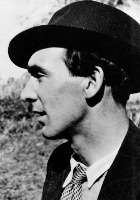George Barker
George Barker Poems
Most near, most dear, most loved and most far,
Under the window where I often found her
Sitting as huge as Asia, seismic with laughter,
Gin and chicken helpless in her Irish hand,
...
Most near, most dear, most loved, and most far,
Under the huge window where I often found her
Sitting as huge as Asia, seismic with laughter,
Gin and chicken helpless in her Irish hand,
...
January jumps about
in the frying pan
trying to heat
his frozen feet
...
Grandfather, Grandfather,
what do pandas say?
Grandfather, Grandfather,
as among the rocks they roll
...
I looked into my heart to write
And found a desert there.
But when I looked again I heard
Howling and proud in every word
...
Not less light shall the gold and the green lie
On the cyclonic curl and diamonded eye, than
Love lay yesterday on the breast like a beast.
Not less light shall God tread my maze of nerve
...
1
Today, recovering from influenza,
I begin, having nothing worse to do,
This autobiography that ends a
...
Turn on your side and bear the day to me
Beloved, sceptre-struck, immured
In the glass wall of sleep. Slowly
Uncloud the borealis of your eye
...
1
Meandering abroad in the Lincolnshire meadows day
Day and day a month perhaps, lying at night lonely,
...
As it has for so long
come wind and all weather
the house glimmers among
the mists of a little
...
What is it you remember? - the summer mornings
Down by the river at Richmond with a girl,
And as you kissed, clumsy in bathing costumes,
...
To the memory of my father
At Thurgarton Church the sun
burns the winter clouds over
...
O Child beside the Waterfall
what songs without a word
rise from those waters like the call
...
The words are always as
strange and dead as those
fragments and oddments that
the wave casts up on the shore:
...
Came up that cold sea at Cromer like a running grave
Beside him as he struck
Wildly towards the shore, but the blackcapped wave
Crossed him and swung him back,
...
George Barker Biography
George Granville Barker was an English poet and author. Life and Work Barker was born in Loughton, near Epping Forest in Essex, England, elder brother of Kit Barker [painter] George Barker was raised by his Irish mother and English father in Battersea, London. He was educated at an L.C.C. school and at Regent Street Polytechnic. Having left school at an early age he pursued several odd jobs before settling on a career in writing. Early volumes of note by Barker include Thirty Preliminary Poems (1933), Poems (1935) and Calamiterror (1937), which was inspired by the Spanish Civil War. In his early twenties, Barker had already been published by T. S. Eliot at Faber and Faber, who also helped him to gain appointment as Professor of English Literature in 1939 at Tohoku University (Sendai, Miyagi, Japan). He left there in 1940 due to the hostilities, but wrote Pacific Sonnets during his tenure. He then travelled to the United States where he began his longtime liaison with writer Elizabeth Smart, by whom he had four of his fifteen children. Barker also had three children by his first wife, Jessica. He returned to England in 1943. From the late 1960s until his death, he lived in Itteringham, Norfolk, with his wife Elspeth Barker, the novelist. In 1969, he published the poem At Thurgarton Church, the village of Thurgarton being a few miles from Itteringham. Barker's 1950 novel, The Dead Seagull, described his affair with Smart, whose 1945 novel By Grand Central Station I Sat Down and Wept was also about the affair. His Collected poems were edited by Robert Fraser and published in 1987 by Faber and Faber. In describing the difficulties in writing his biography, Barker was quoted as saying, "I've stirred the facts around too much, ... It simply can't be done". Yet, Robert Fraser did just that with; The Chameleon Poet: A Life of George Barker.)
The Best Poem Of George Barker
To My Mother
Most near, most dear, most loved and most far,
Under the window where I often found her
Sitting as huge as Asia, seismic with laughter,
Gin and chicken helpless in her Irish hand,
Irresistible as Rabelais, but most tender for
The lame dogs and hurt birds that surround her -
She is a procession no one can follow after
But be like a little dog following a brass band.
She will not glance up at the bomber, or condescend
To drop her gin and scuttle to a cellar,
But lean on the mahogany table like a mountain
Whom only faith can move, and so I send
O all my faith, and all my love to tell her
That she will move from mourning into morning.

I want to read a poem by George Barker called Dionysus.